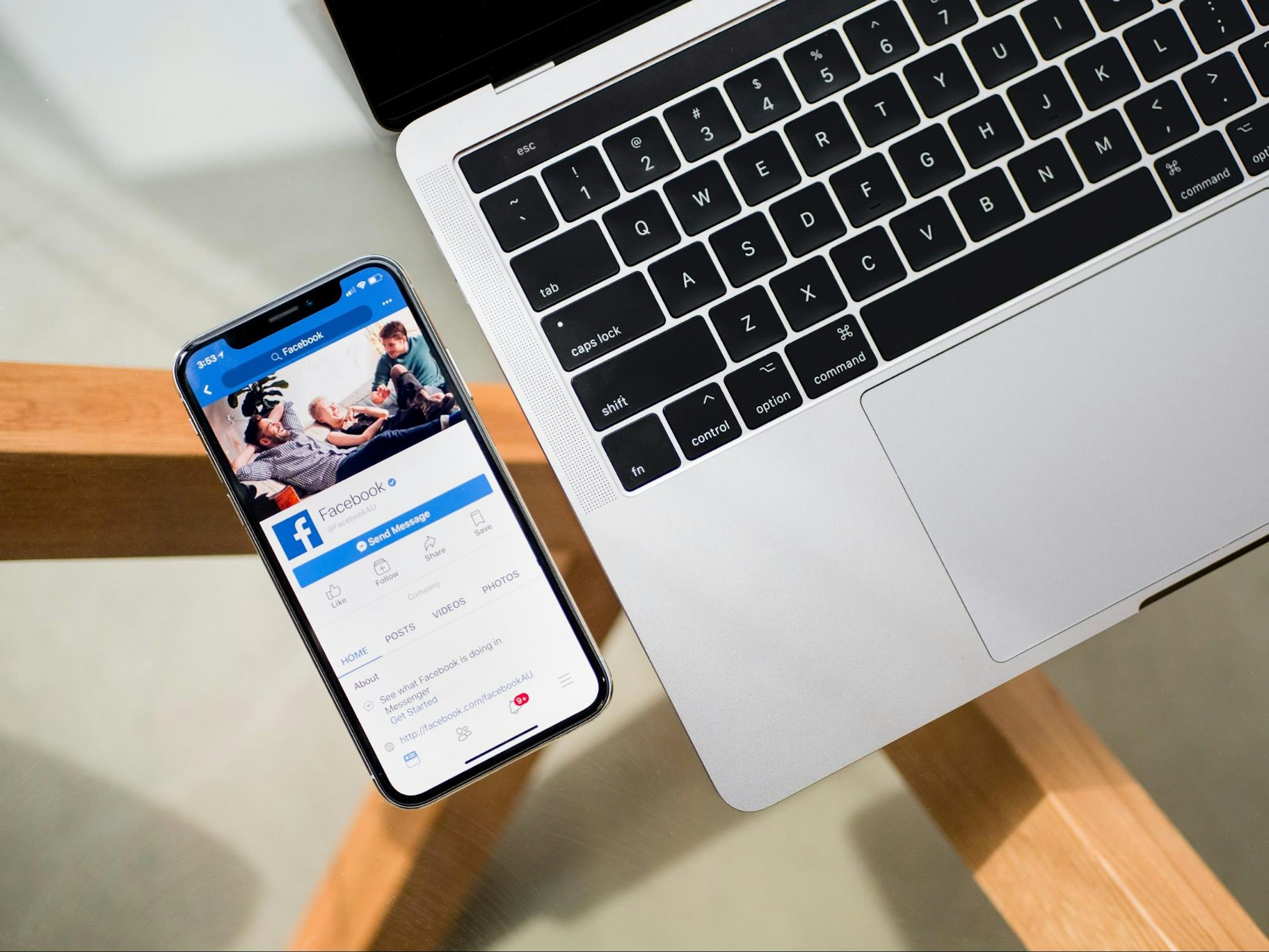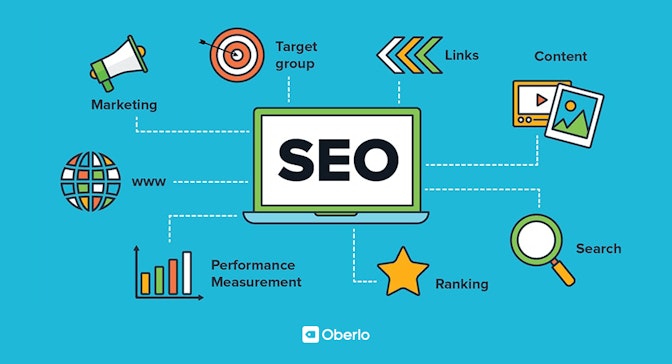Wouldn’t you love to see what your competitors are up to?
Better yet, wouldn’t you love to see the exact Facebook and Instagram advertisements that they’re using right now to hook in new customers?
Well, you can!
There’s now a simple and free way to view the Facebook and Instagram advertisements that a brand is currently running.
This article will show you how.
And make sure to stick around for the best part: In the second half of this article, you’ll learn to extract strategic insights from your competitor’s ads to improve your own campaigns.
#Win
Post Contents
- Introducing Facebook Info and Ads
- How to View Your Competitor’s Instagram Ads
- 5 Ways You Can Gain Strategic Insights From Your Competitors’ Ads
- Facebook Info and Ads Limitations
- How to View Your Competitor’s Facebook Ads on Mobile Devices
- Bonus: How to View Your Competitor’s Promoted Tweets on Twitter
- Warning: Stay Customer-Focused
- Summary
- Want to Learn More?



Introducing Facebook Info and Ads
In 2018, Facebook introduced a new feature to Pages called “Info and Ads.”
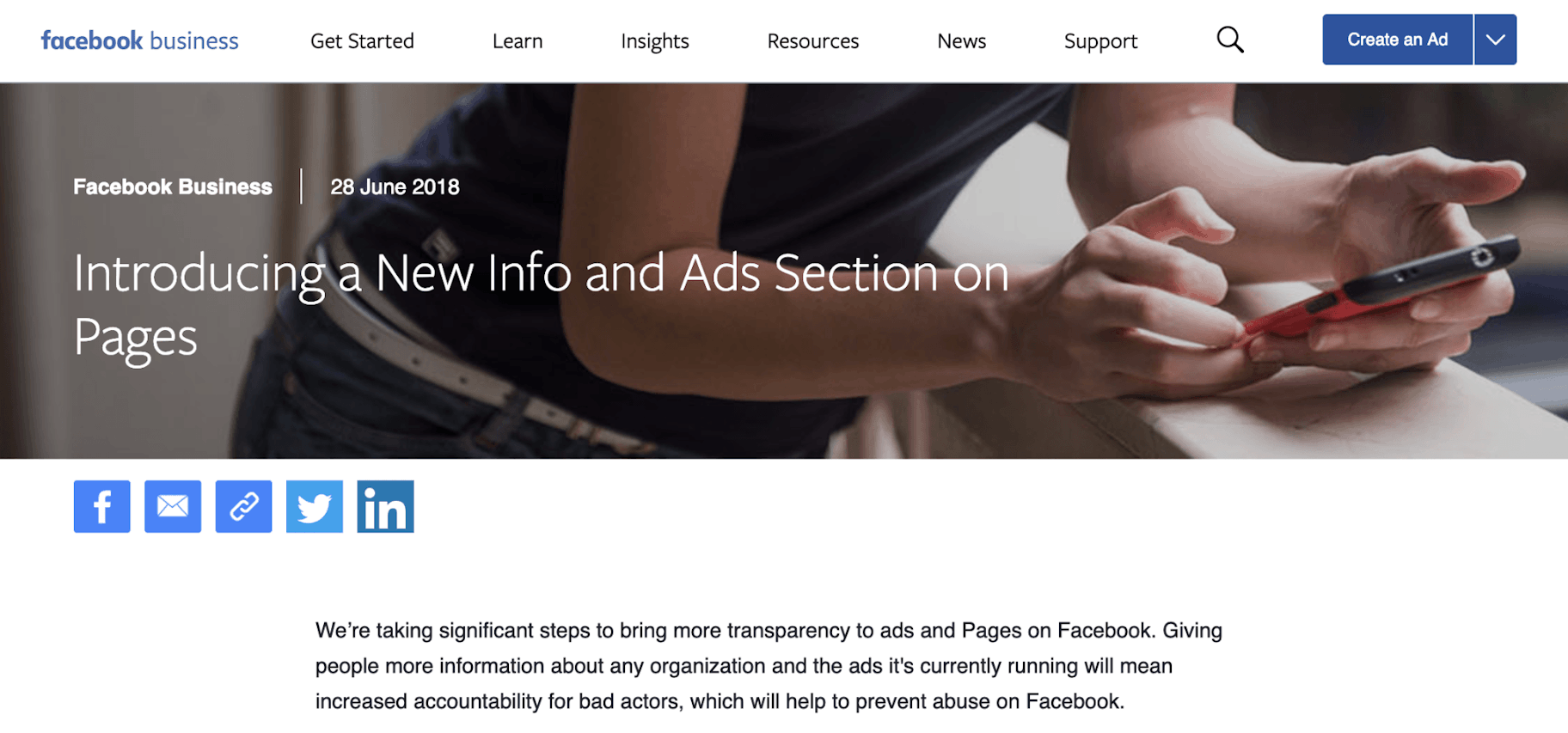
→ Click Here to Launch Your Online Business with Shopify
Why?
Over the years, Facebook has been criticized a lot on issues such as privacy, tracking, censorship, and election interference.
As a result, many people are pushing the social networking platform to become more transparent.
Info and Ads is one way Facebook is doing this.
It was specifically designed to increase transparency and accountability for bad actors, which will hopefully help to prevent abuse on Facebook.
Facebook said, “We believe that when you visit a Page or see an ad on Facebook it should be clear who it’s coming from. We also think it’s important for people to be able to see the other ads a Page is running, even if they’re not directed at you.”
Turns out this transparency play can also be a win for businesses advertising on Facebook and Instagram. Let’s find out how.
What Exactly is Facebook Info and Ads?
Facebook Info and Ads is a section included on every Facebook Page. It allows people to see more information about any organization on Facebook. It also lets people view the active ads a Page is running across Facebook, Instagram, Messenger, and Audience Network.
So how can you start using Facebook Info and Ads?
How to View Your Competitors’ Facebook Ads
To begin, find a brand you’re interested in and head to their Facebook Business Page.
Look for the “Page Transparency” section.
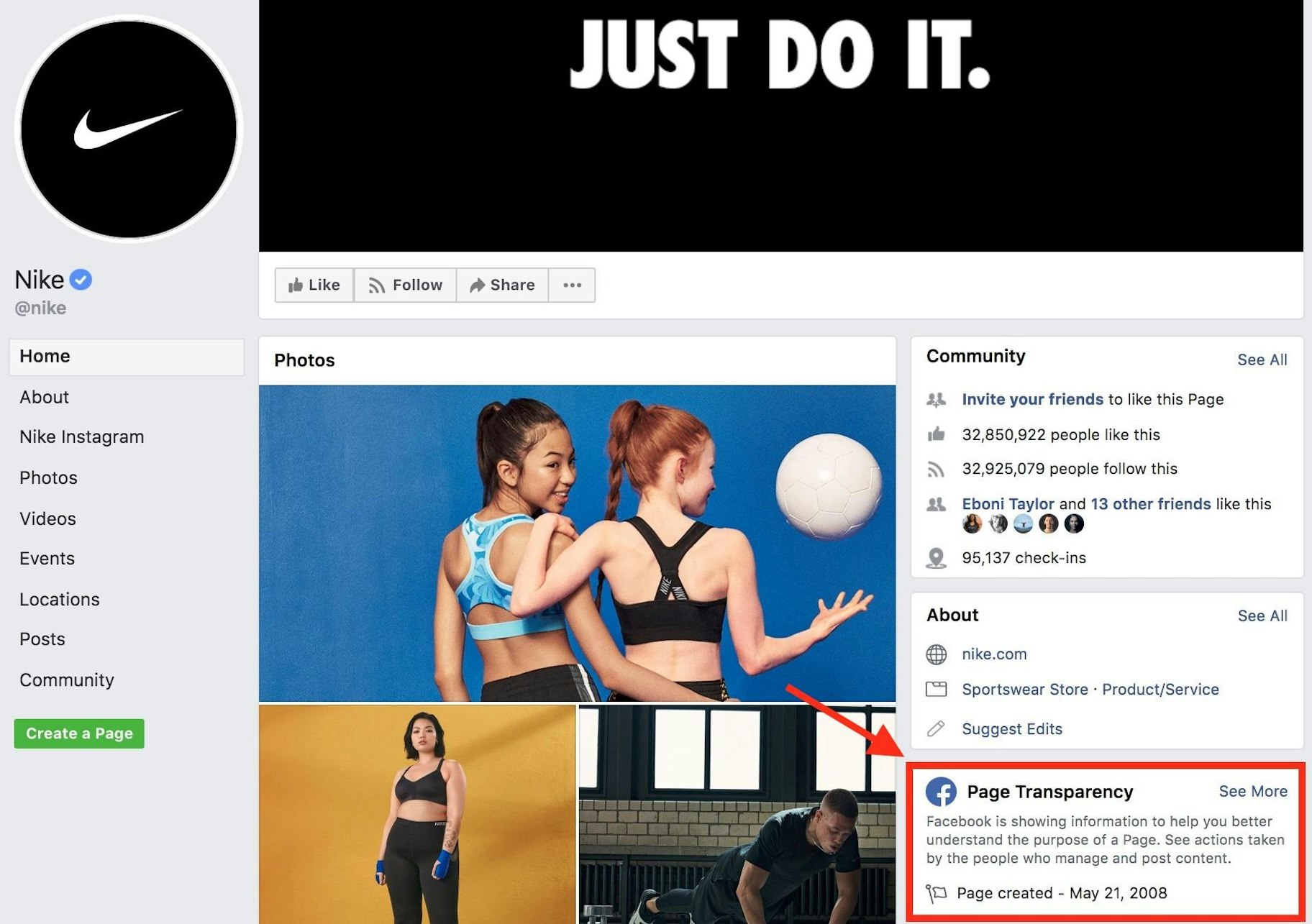
Next, click on “See More,” and you’ll have a chance to explore ads in the “Ad Library.”
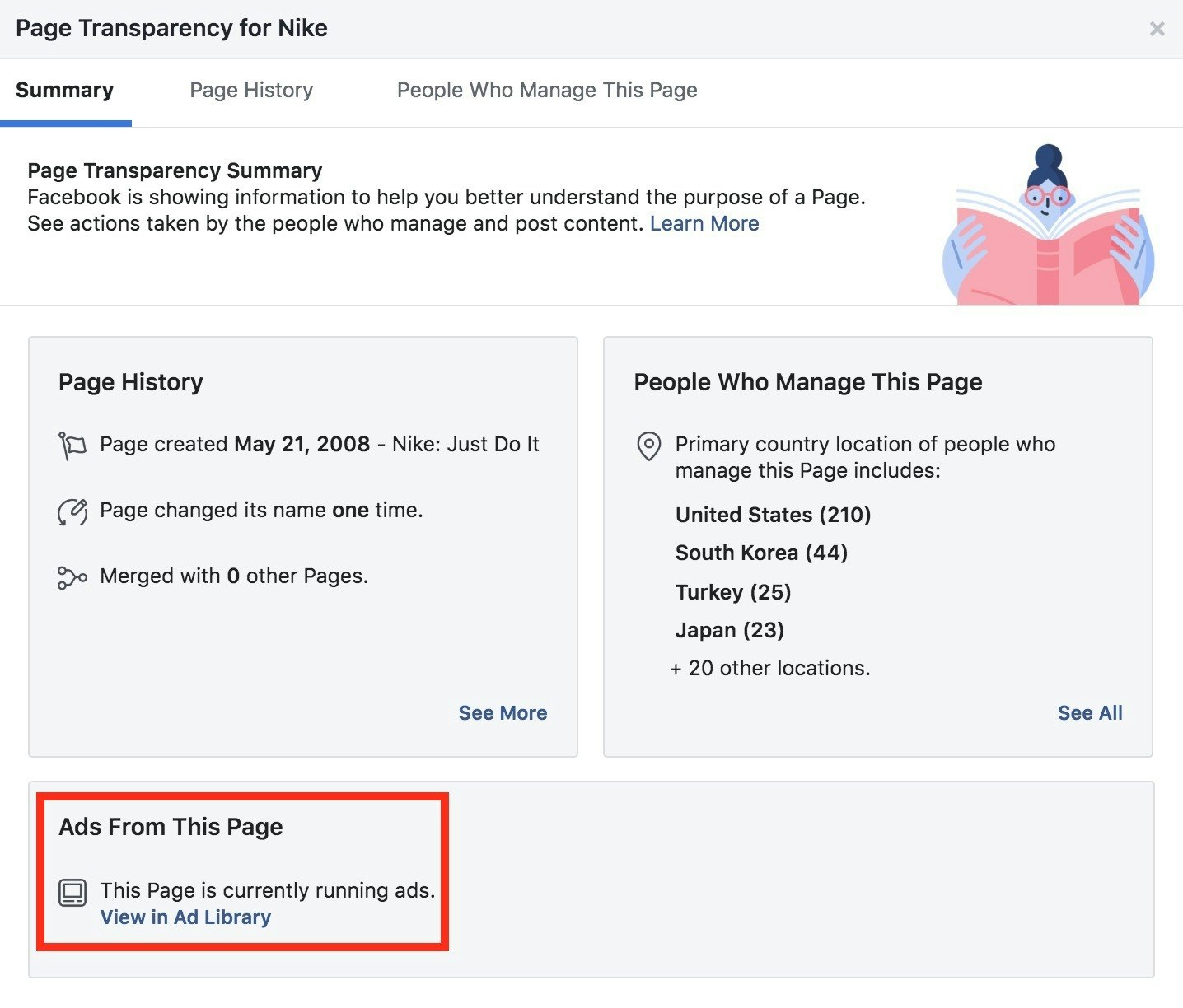
Once in the Ad Library, you can view all of the Page’s active ads, even if you aren’t part of the target audience.
What’s more, Facebook also lets you view ads by country.
For example, if you just want to view ads that the Page is running in the U.S., just click the drop-down menu of countries and select the United States.
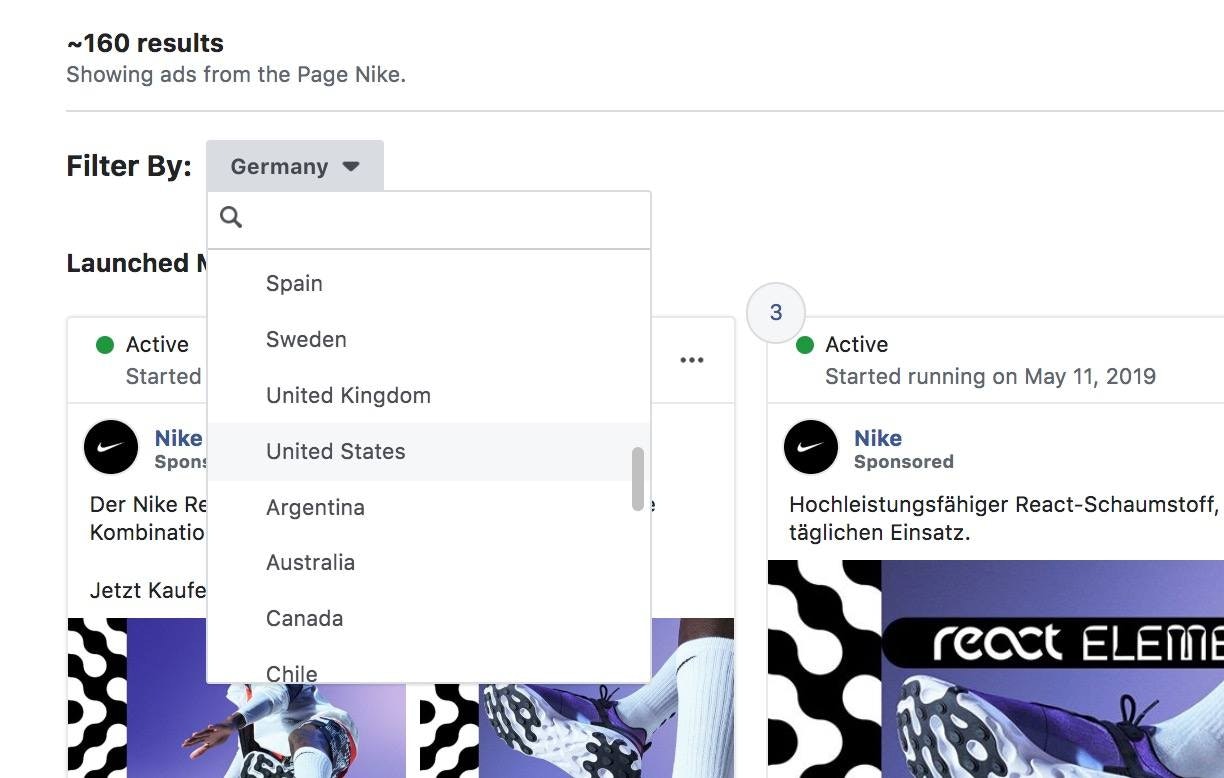
Alternatively, you can go straight to Facebook’s new Ad Library.
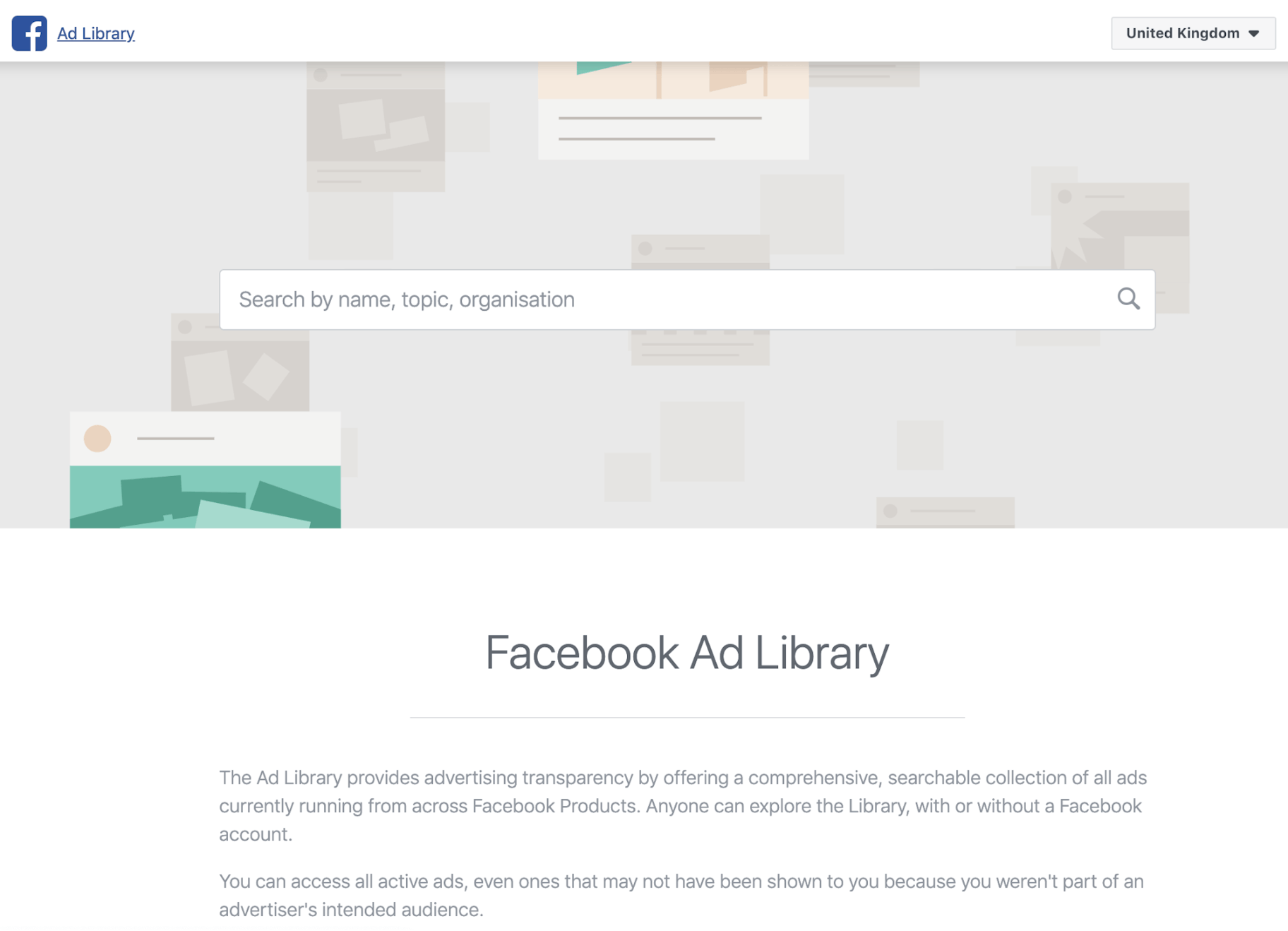
This provides another way to see a Facebook Page’s active ad campaigns. (If the page is political in nature, then you can even see how money it’s spent on advertising.)
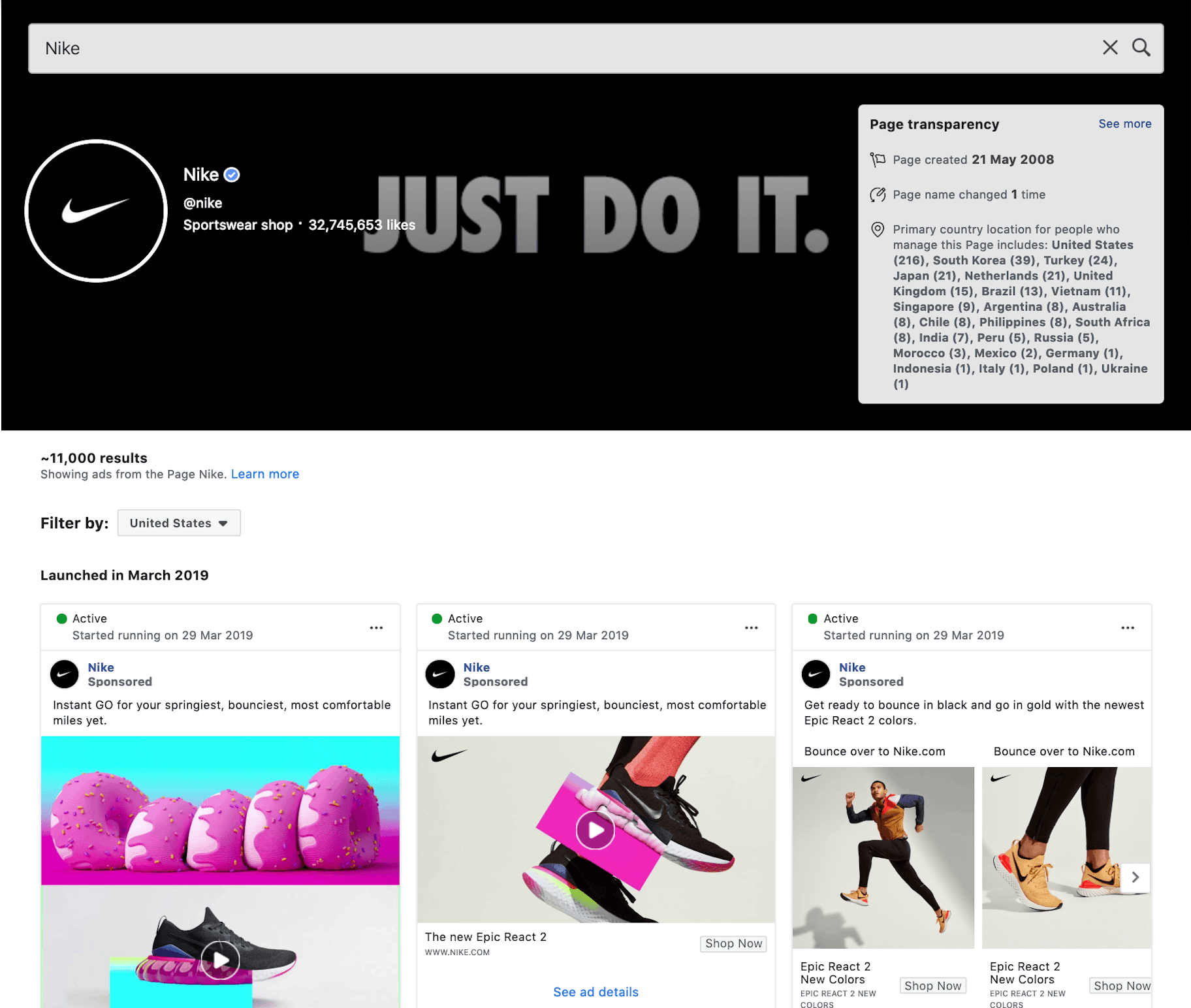
How to View Your Competitor’s Instagram Ads
If you’re more active on Instagram than Facebook, you might want to only see the ads your competitor is running on Instagram.
Here’s how:
To get started, navigate to the Instagram profile you’d like to learn more about.
Then, tap the three horizontal dots indicating a menu in the top right-hand corner of the screen.
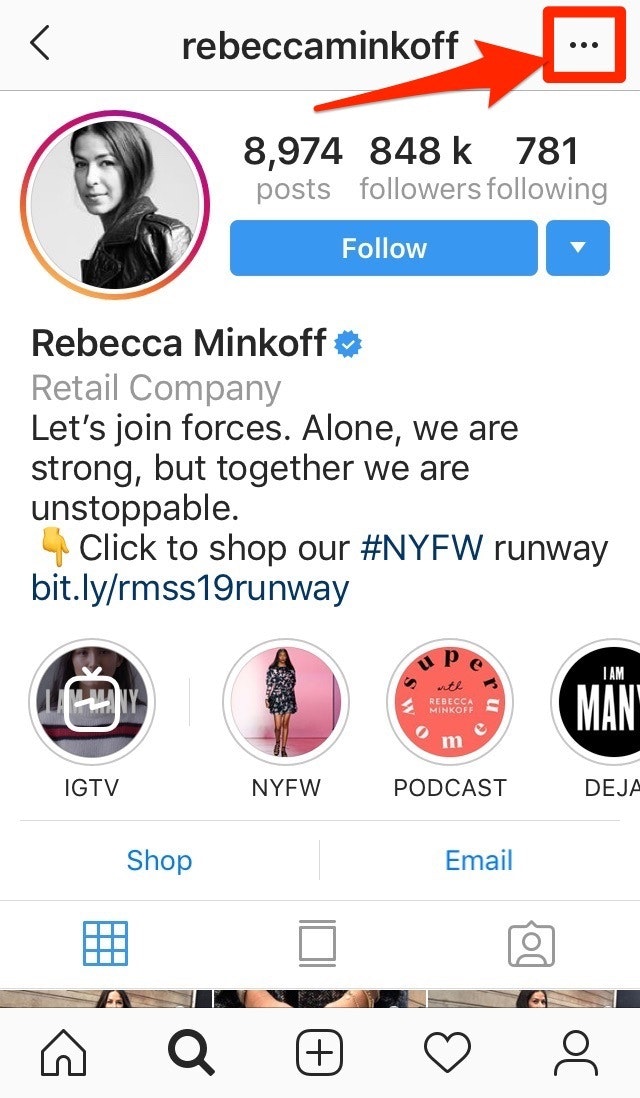
This will bring up a menu related to the profile. Here, tap “About The Account” to be taken to Info and Ads on Instagram.
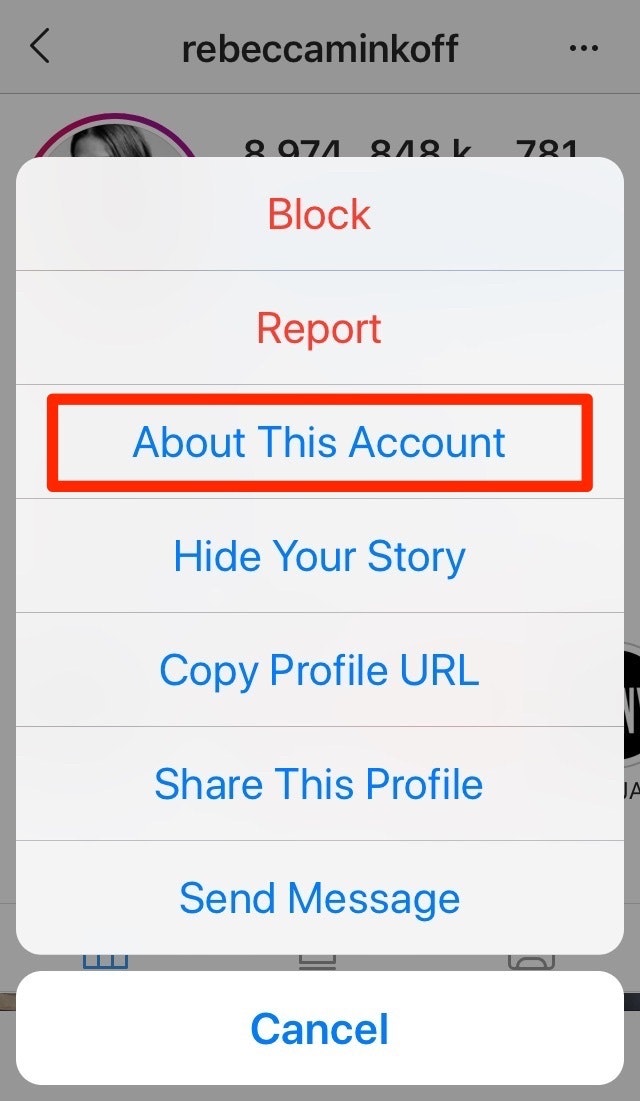
Here, you can find general information about the page, but to see the ads it’s running, you need to tap “Active ads.”
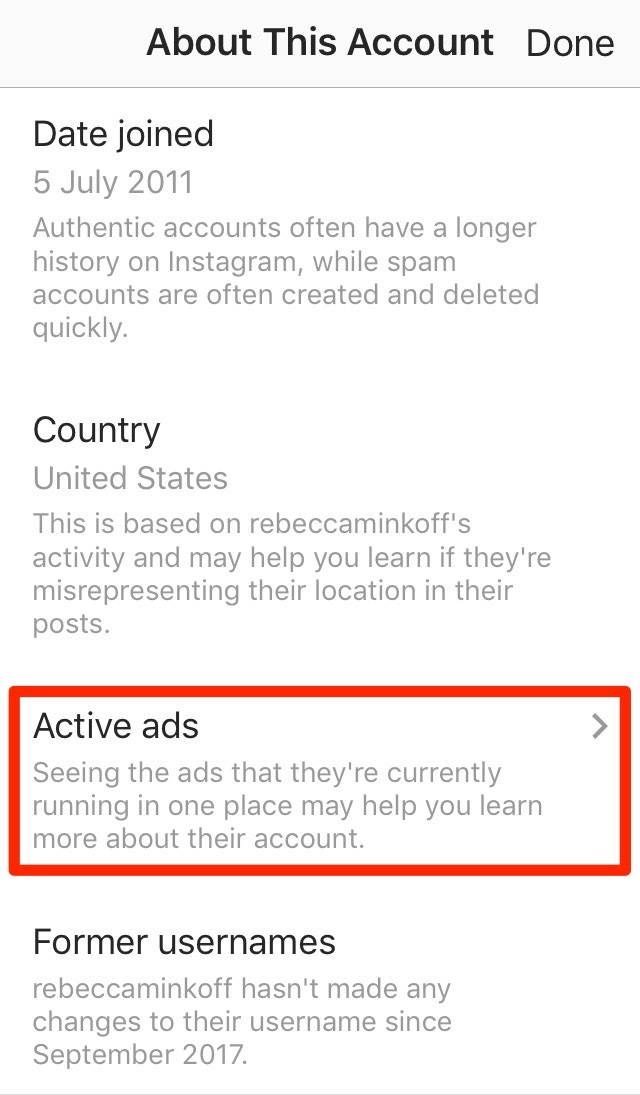
The best part is that Instagram Info and Ads allows you to view ads by format. Just tap “Feed” or “Story” and then tap on an ad to see it.
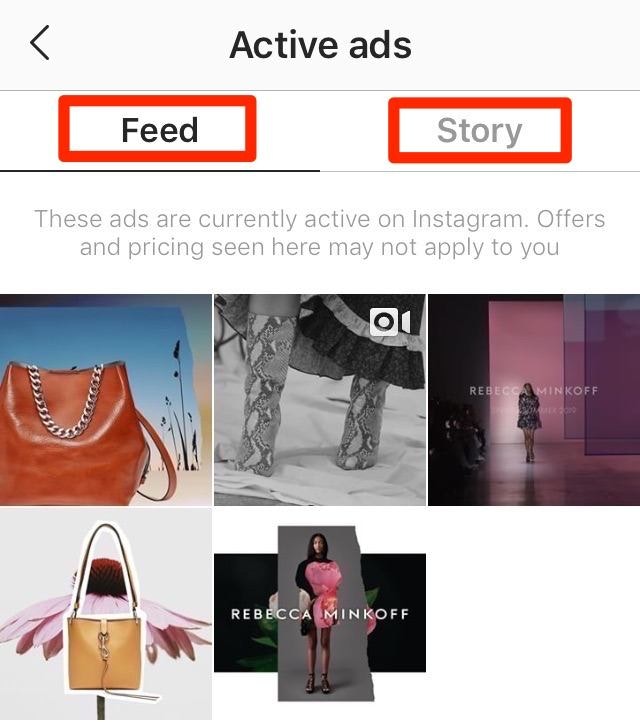
Okay, but how can you use knowledge about your competitor’s ads to improve your own marketing strategy?
5 Ways You Can Gain Strategic Insights From Your Competitors’ Ads
Spying on your competitors’ ads isn’t just interesting.
If you do it right, it can be incredibly useful in helping you to improve your own advertising campaigns.
While you definitely don’t want to flat out copy your competitors, you can glean inspiration and insights from their ads.
This is especially useful if you’re just starting a new business.
Why?
Well, by identifying the successful tactics your more established competitors are using, you can fast-track your way past a lengthy process of trial and error.
Thanks to Facebook Info and Ads, this is easier than it’s ever been.
And with 24.2 percent of Facebook Pages using paid media, there’s a lot of brands out there that you can learn from.
You might not be able to see detailed information about an ad’s targeting or engagement, but there’s plenty of insights available if you know what to look for.
Here are five things to evaluate when spying on your competitors’ ads.
1. Images or Videos
First things first: Images and videos are arguably the most important part of an advertisement.
Why?
To start, Facebook posts with images see 2.3 times more engagement than those without images.
But visuals don’t just get more engagement, they also create a longer-lasting impression.
In fact, when people hear information, they’re likely to remember only 10 percent of the information three days later. However, if a relevant image is paired with that same information, people retained 65 percent of the information three days later.
That’s a huge increase.
The lesson? Pay close attention to the kind of visuals your competitors are using. What do they feature? How are they styled? What are the lighting or graphics like?
Also, when viewing your competitor’s ads on Facebook Info and Ads, look for ads that contain the same text with different visuals.
The ads from MVMT below showcase four different images paired with the same copy:
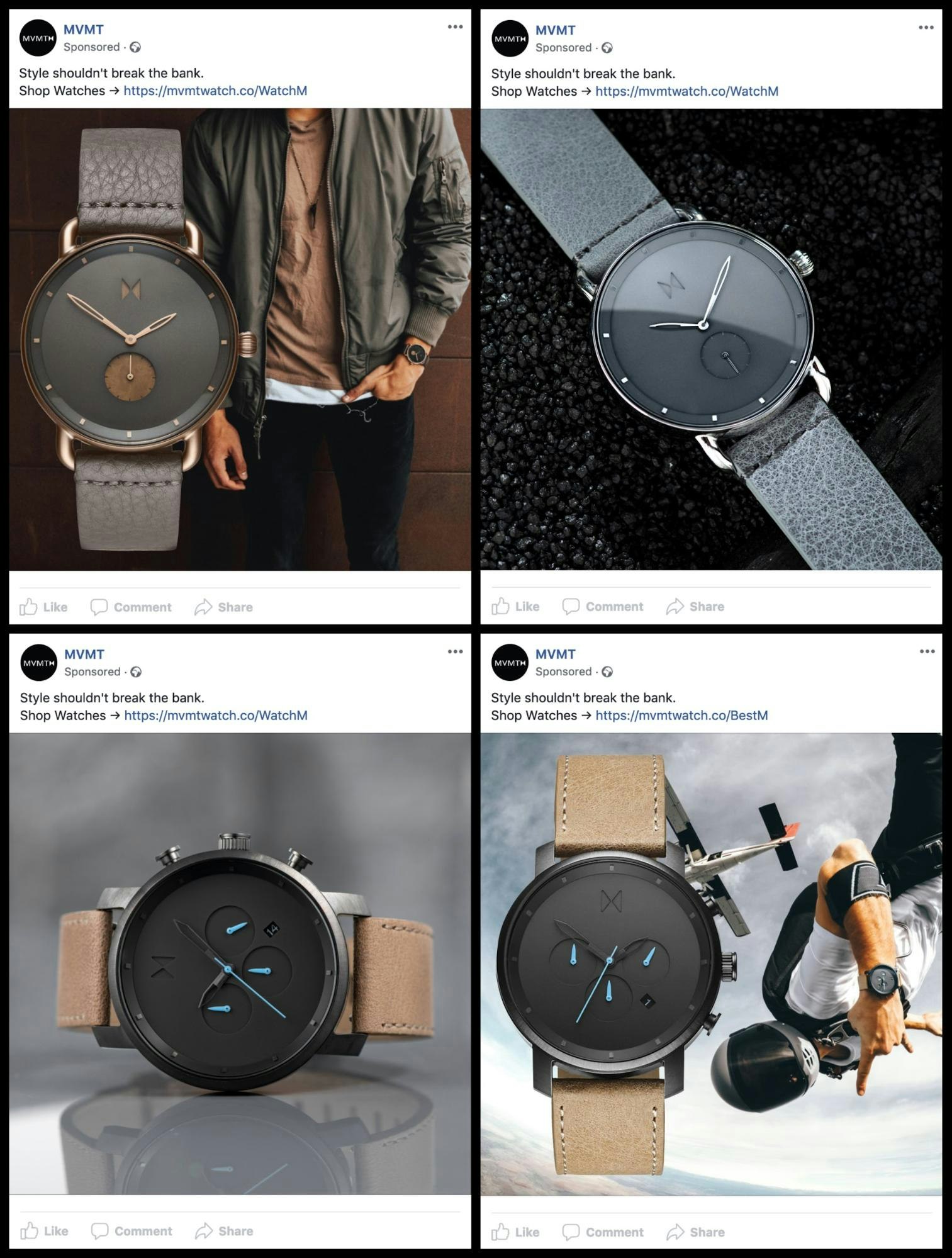
Now, although we can’t tell how each of the ads is performing, we can get a general sense of the style MVMT are consistently using.
To start, the product itself takes center stage in all of the images.
It’s also clear that MVMT is trying to determine which performs best: product photos or product photos with an additional lifestyle component.
You could come back at a later date to see which images they’re still using and which ones they’ve dropped. This is likely to tell you which images perform best.
2. Headlines
After the visual, the headline is the next component to pay close attention to.
As the famous advertising tycoon David Ogilvy once remarked, “On the average, five times as many people read the headline as read the body copy. When you have written your headline, you have spent eighty cents out of your dollar.”
Much has changed in the decades since, but effective headlines are still paramount to advertising success.
The image below features two ads from GoPro that share the same image and link.
The key difference is the headline.
One ad reads, “Not splash proof. Not kind-of proof. Waterproof. Up to 10m. #GoProHERO7”
And the other reads, “Waterproof to 10m. Let that sink in. #GoProHERO7.”
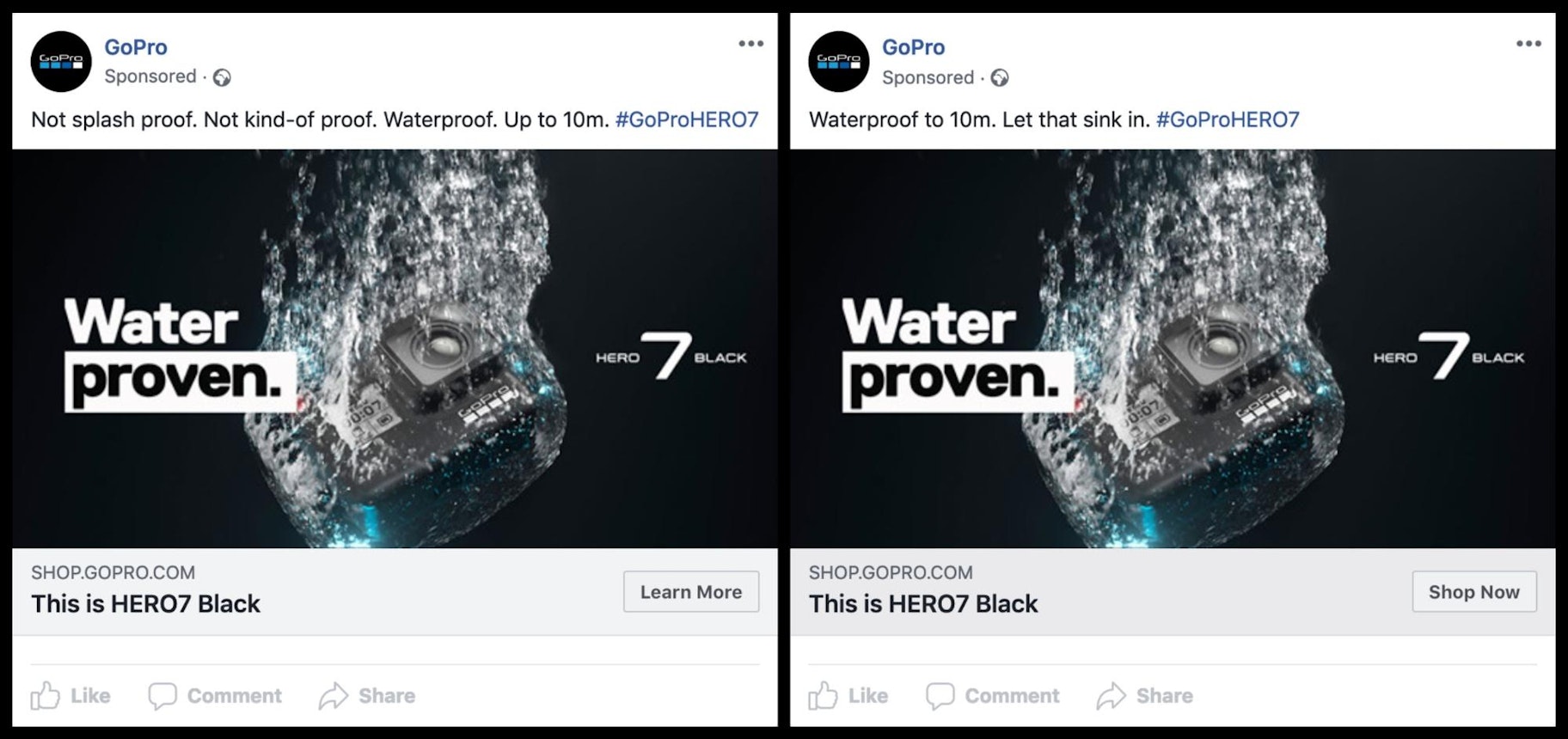
Both are short, snappy, and benefit-driven. Notice also that both contain the branded hashtag, “#GoProHERO7.”
However, the headline isn’t the only difference between these two ads. Did you spot the other difference?
It’s the call to action button text – one button reads, “Learn More” and the other reads “Shop Now.”
Again, both are to the point.
However, it’s worth noting that the first button is softer and the second more intent on driving a sale.
3. Copywriting
The next element to think about is the ad’s text – often referred to as “copy” in the advertising industry.
Again, look for variations in the advertisements to draw out commonalities.
Is the brand using copy that’s short or long? What type of language are they using, formal or informal? Serious or humorous? Are they using text only or do they consistently include emojis and hashtags?
Also, note how great brands consistently present desirable benefits.
When creating an ad it’s always best to focus on benefits rather than features – one of the early Apple iPod advertisements demonstrates this principle perfectly.
They didn’t present the feature: storage for 1GB of MP3s. Instead, they communicated the benefit it provided: “1,000 songs in your pocket.”
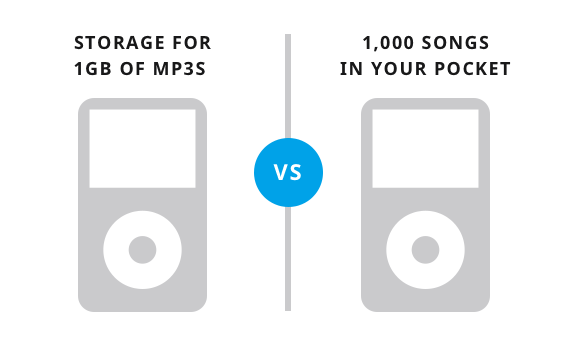
In this next set of advertisements from Red Bull, they use the same video with different copy.
However, all three versions of the copy focus on the benefits the viewer has to gain from consuming the content.
Red Bull writes, “Build strength and learn how to prevent injury,” “Stay on top of your fitness goals,” and “Whether you want to improve your speed or learn how to avoid injury…”
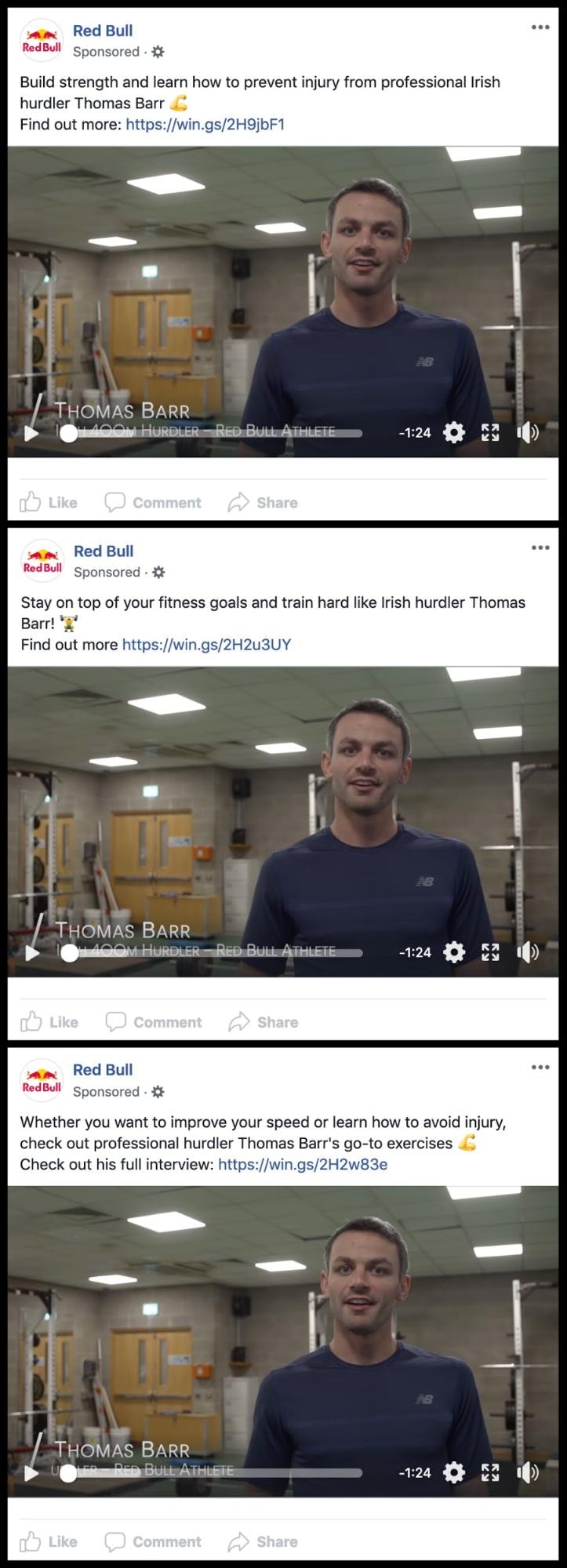
Notice also how the first two ads share the same call to action, “Find out more,” but the last ad reads, “Check out his full interview.”
Each ad also features a single fitness related emoji.
4. Offers and Deals
The next element to evaluate is the offer or deal presented.
Identifying the types of offers and deals that your competitors use can be a good place to begin when looking to create your own product promotions.
Again, draw comparisons and look for similarities.
Does the brand provide discount codes, free shipping, or other incentives? How do they present them? If they provide discounts, what percentage do they offer?
Also, try to understand how the brand incorporates the promotion into the larger campaign.
Offering 10 percent off to your customers for no reason is suspect. Viewers will wonder if you simply raised the price by 10 percent so you could tell them it’s “10 percent off.”
Instead, look for the justifications and genuine reasons behind the incentives that give them credibility.
Here are two Facebook ads from Finisterre:
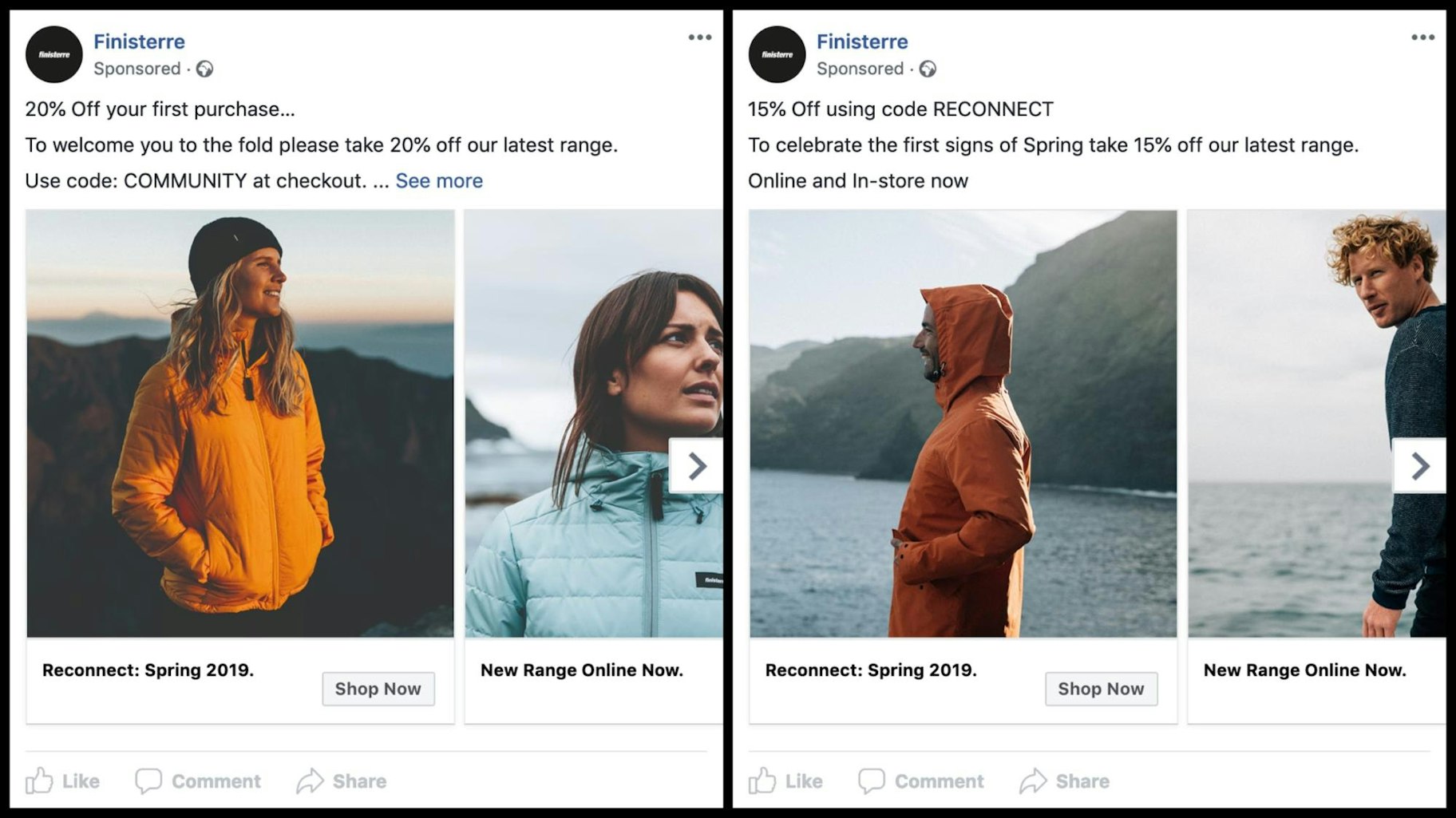
Both provide a discount code for different reasons at different amounts.
The first offer is 20 percent off for first time purchases. This can be an effective way to bring in new customers.
And although you might not make so much money on their first purchase, you can make more money later on. Not only can use email marketing and retargeting, but repeat customers spend an average of 67 percent more than new customers.
For these reasons, it makes sense why Finisterre is happy to provide such a large discount for new customers at 20 percent.
The second ad presents a discount code for 15 percent off.
Finisterre’s “Reconnect” campaign seems like it could be trying to re-engage previous customers to boost sales of their new Spring collection.
5. Inferred Audience Targeting
Lastly, when spying on your competitor’s ads, see if you can glean insights about the particular audience they’re targeting.
This might help to inform your own ad targeting.
It’s clear who the ads from Chubbies below are targeting – everyday men in their 20’s and 30’s.

This is clear from the models used in the advertisements.
Instead of using airbrushed, photogenic, fitness models, Chubbies simply uses average men having fun.
But that’s not all.
The copy in each of the ads is casual, humorous, and entertaining – “Business shirts made with extra stretchy business material for doing business in.”
All in all, it’s clear that these advertisements are for everyday guys who don’t take life too seriously.
Facebook Info and Ads Limitations
Unfortunately, you don’t get information about the various different formats or platforms the ads are displayed on.
This means that the ads you see might be running on Facebook, Instagram, Messenger, or Facebook’s Audience Network.
Plus, the transparency doesn’t extend to targeting settings.
As mentioned, you can view ads by country, but that’s about it. You can’t see detailed targeting settings such as audience interests, demographics, or ad spend.
You also can’t view the ad’s engagement.
When using Info and Ads, you’ll notice that you can click on the elements of the ad itself, such as links, images, or videos.
But you can’t see the number of likes, views, or shares the ad has received. In the Facebook ad below from Good American, you can see these engagement options are greyed out.
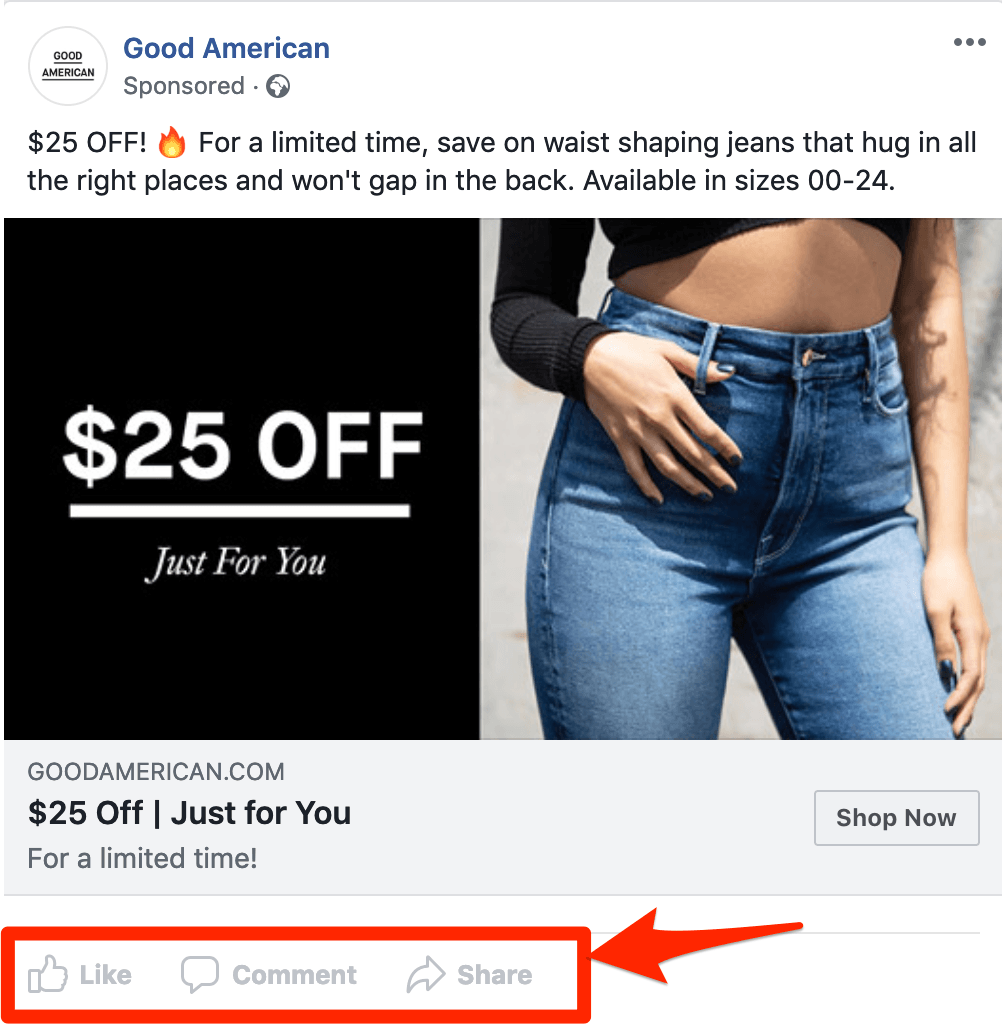
It’s also worth noting that impressions and video views won’t be counted on ads within Facebook Info and Ads section. And advertisers won’t be charged when users click on ads here.
In addition to ads, you can see information regarding the Page’s use and history.
In the image below, you can see that Gymshark’s Facebook Page was created on the 5th of September 2011 and that it was originally named “Gymshark.co.uk.”
You can also see the primary locations of the people who manage the Page – in this case, 31 people in the United Kingdom, one in Norway, and one in the United States.
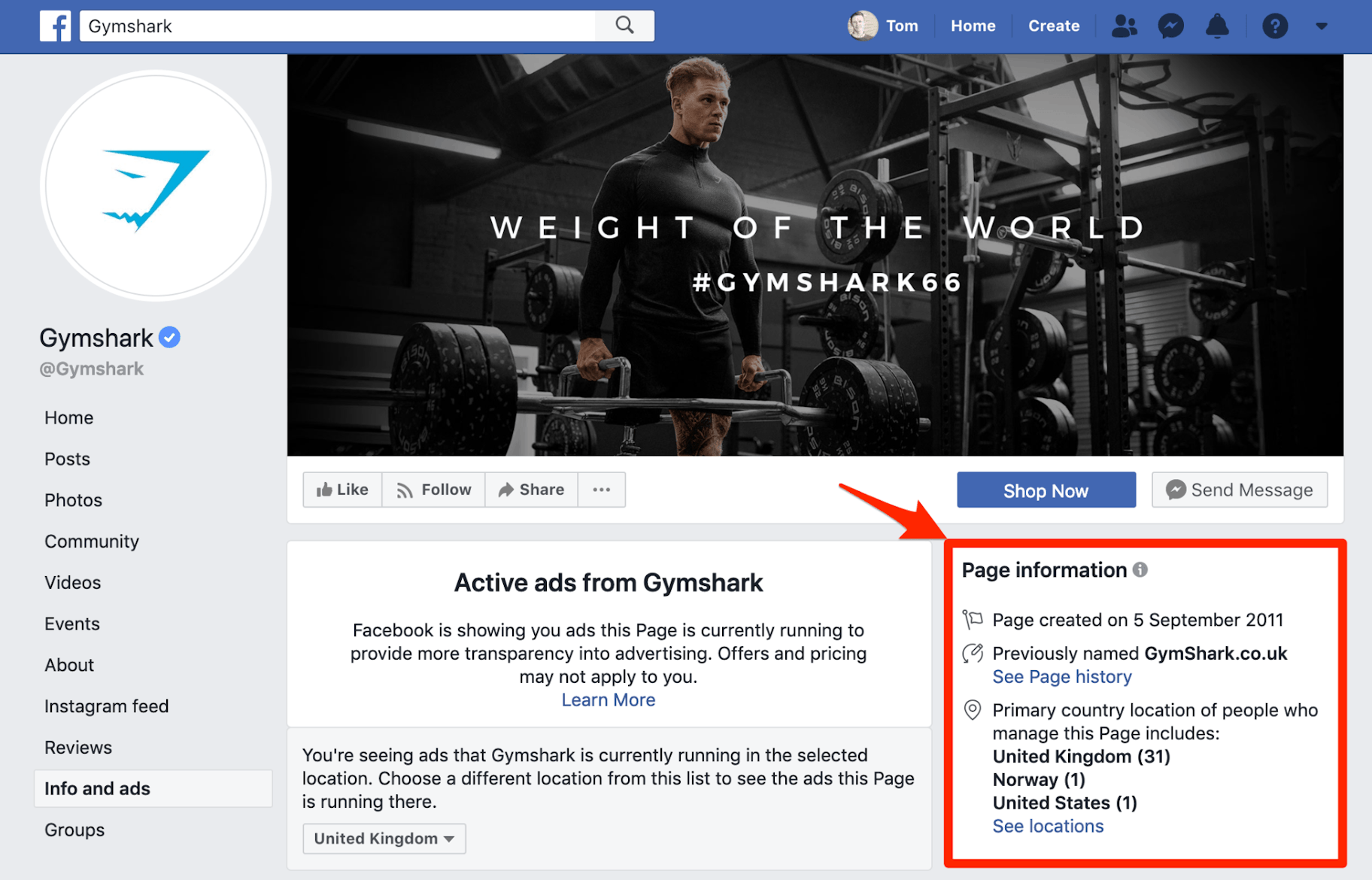
Moving forward, Facebook said, “We will continue to add to the information we share about Pages over time.”
So who knows what we might be able to access in the future!
How to View Your Competitor’s Facebook Ads on Mobile Devices
If you want to be able to spy on a competitor’s Facebook ads while you’re on the move, you can access Info and Ads on Facebook’s mobile app.
How?
Well, there isn’t a sidebar menu of tabs on mobile devices. Instead, Facebook provides an “i” icon that hovers over the bottom-right hand corner of the Facebook cover photo.
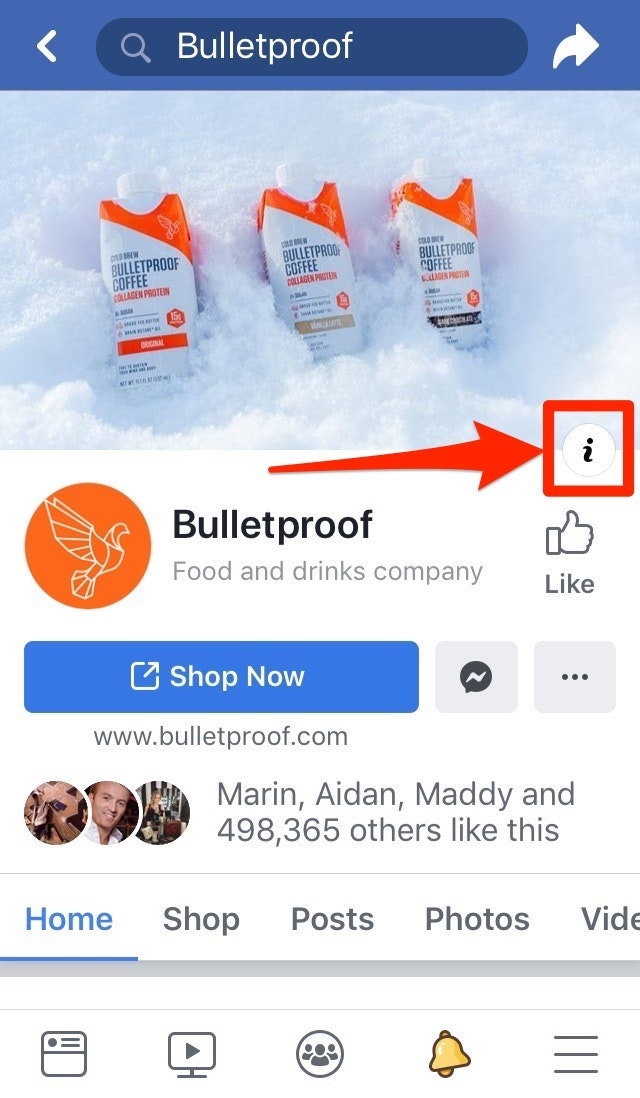
Simply tap this icon to be taken straight to the Facebook Page’s Info and Ads section.
At first, you’ll see the “Page info” section. To see the Facebook Page’s ads, just tap “Active ads” and scroll down.
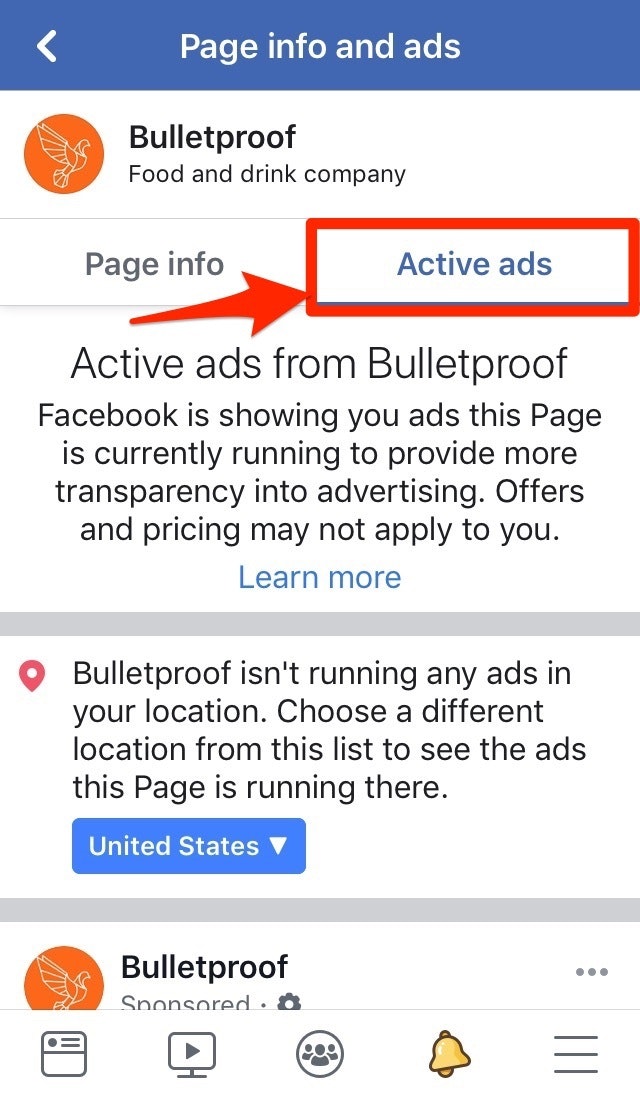
Then, just like on desktop you’re able to selectively view ads by country using the blue drop-down menu.
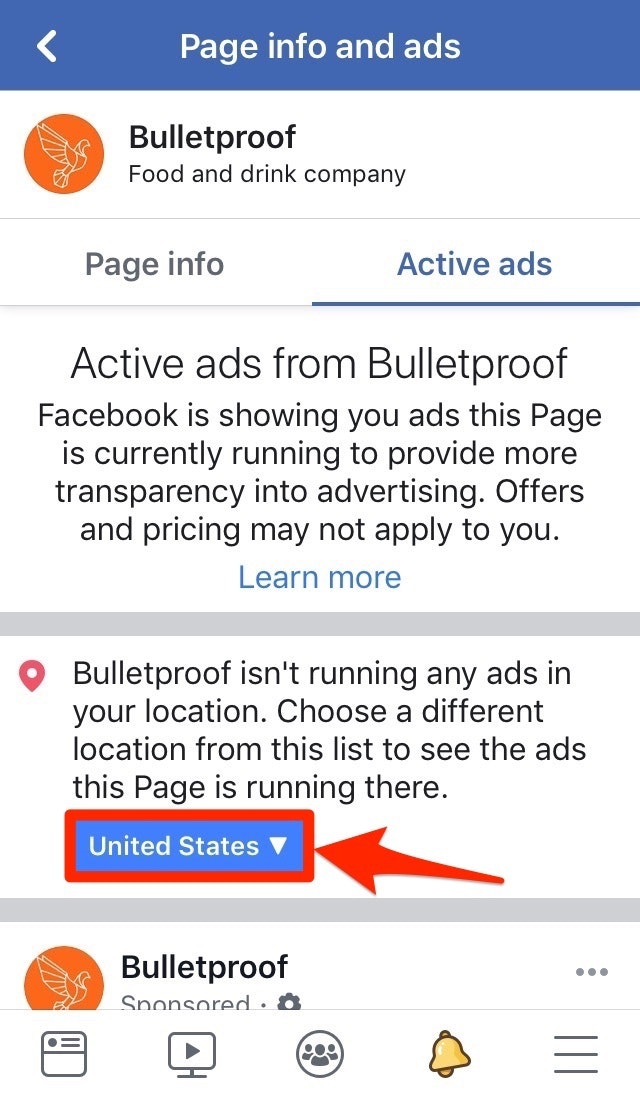
Easy, right? But the fun doesn’t stop there.
Bonus: How to View Your Competitor’s Promoted Tweets on Twitter
Just like Facebook, Twitter is attempting to bring more transparency and accountability to its platform, saying:
“Twitter is a platform that enables global conversation, and we believe that transparency is a core part of who we are. As part of our commitment to be more transparent, we’ve created a place where you can search for advertisers and see the details behind ads.”
As a result, Twitter now also has a similar feature to Facebook Info and Ads.
This feature allows you to see all Promoted Tweets that an account is currently running on Twitter. What’s more, you can also see Promoted-Only Tweets and Promoted Tweets that were suspended and the reason why.
To get started, head to Twitter’s Ad Transparency Center.
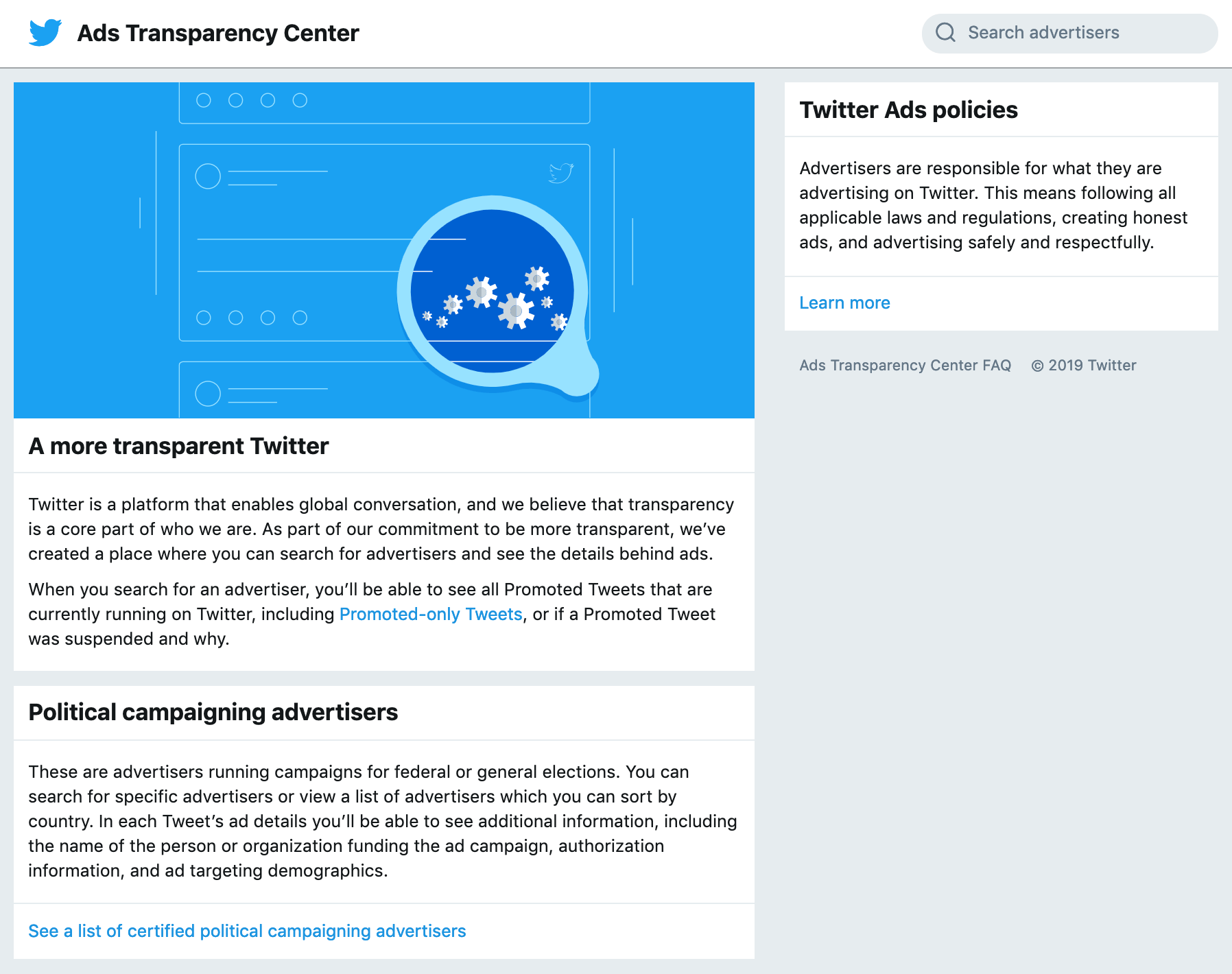
This page provides more detail about the reasons behind the creation of the tool, as well as its functionalities.
To use it, search for an advertiser in the top right-hand search bar and click on their profile – let’s use Nike as an example.
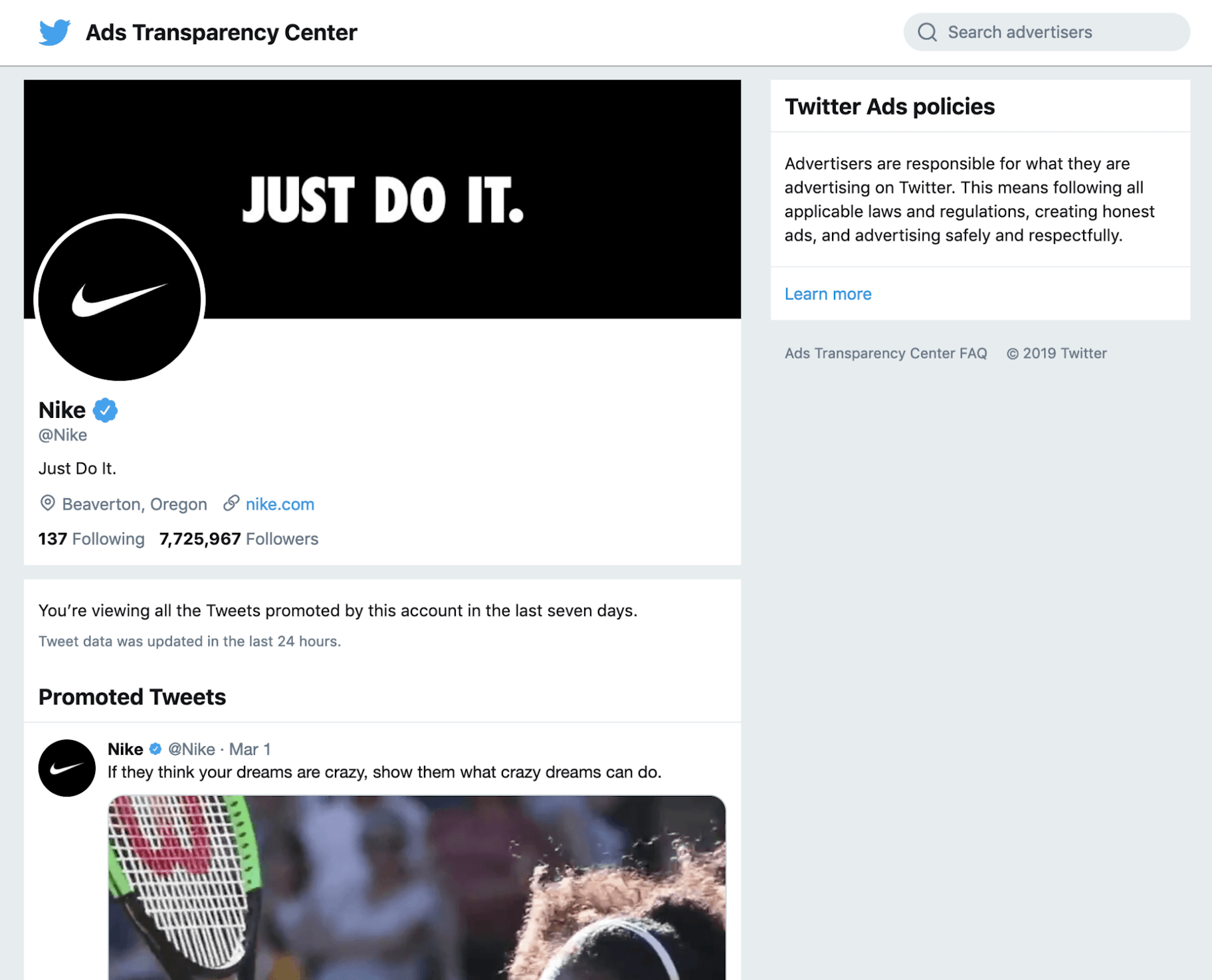
Then, you can scroll down to view all of the Promoted Tweets that the account is running.
Below, you can see that Nike is testing two different images for their Promoted Tweet as both ads contain the same text.
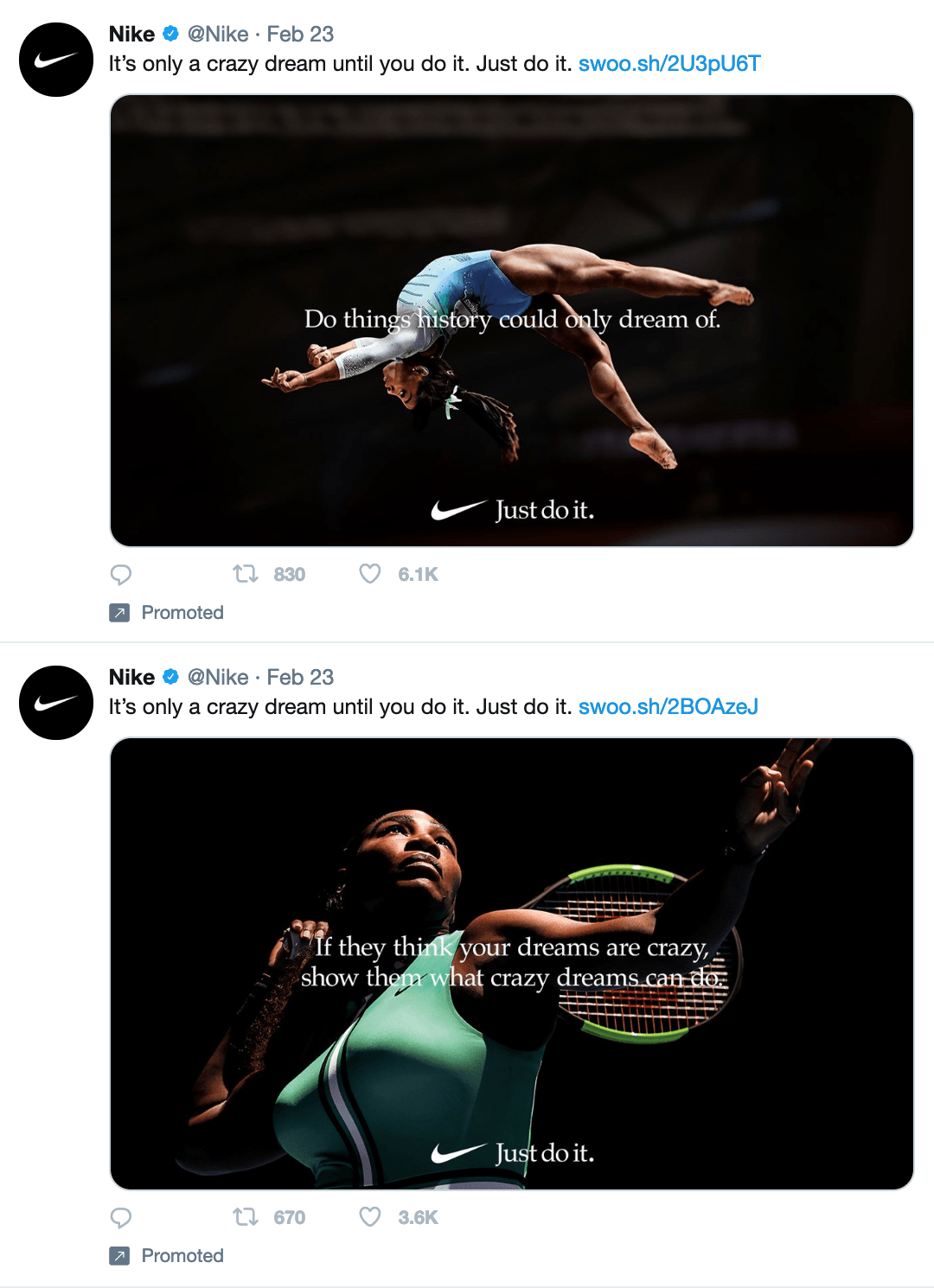
Cool, right?
Warning: Stay Customer-Focused
Before we finish up, heed this warning: Don’t get too caught up in spying on your competitors.
The more you focus on your competitors, the less you’ll focus on your customers. And businesses that focus the majority of their efforts on their competitors are often unsuccessful.
It’s obvious when you think about it.
If you’re always following competitors, you can never create something new and unique. You can only ever follow, copying what’s been done already. That doesn’t sound much like a leading brand, does it?
So what should you focus on? Your customers.
Ultimately, it’s your customers who will determine your success. As Richard Branson, the Founder of Virgin, said, “A business is simply an idea to make other people’s lives better.”
And hey, if this strategy works for the richest man in the world…
Jeff Bezos, the founder of Amazon, shares, “The most important single thing is to focus obsessively on the customer. Our goal is to be earth’s most customer-centric company.”
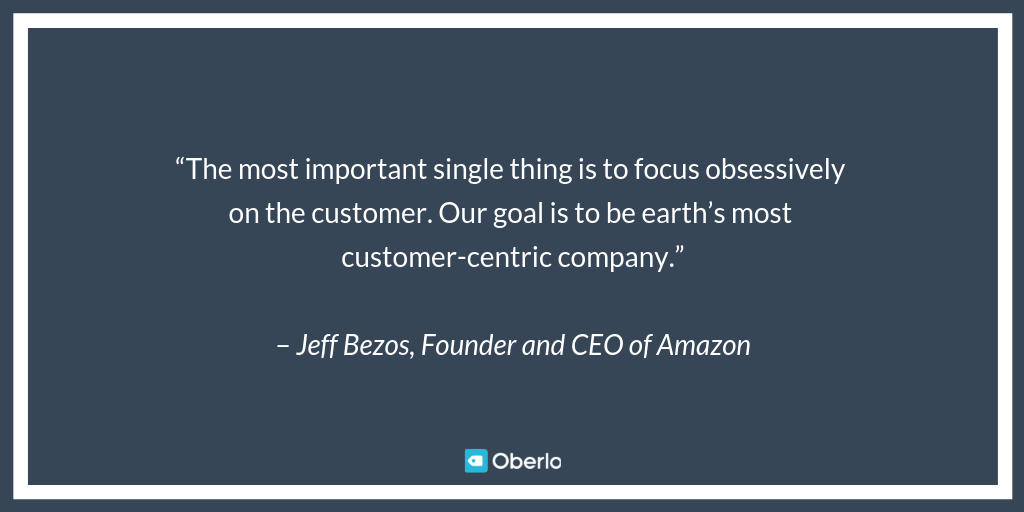
So while it’s useful to know what your competitors are doing, make sure you prioritize serving your customers as best as you can.
How?
Dharmesh Shah, CTO of Hubspot, sums up the customer-focused approach perfectly: “When you’re trying to make an important decision, and you’re sort of divided on the issue, ask yourself: If the customer were here, what would she say?”
Summary
Facebook Info and Ads is a powerful tool when used effectively.
With it, you can now see the exact ad campaigns that your competitors are running on Facebook, Instagram, Messenger, and Facebook’s Audience Network – even if you’re not part of the target audience.
Then you can glean insights to improve your ad strategy.
When evaluating your competitors’ ads, pay close attention to the visuals, headlines, copy, offers, and inferred target audience.
Look for commonalities.
If every ad they are running includes something in particular, it may be a signal that the element performs well.
Learn from others, but be careful not to obsess over your competitors.
Instead, focus on serving your customers.



